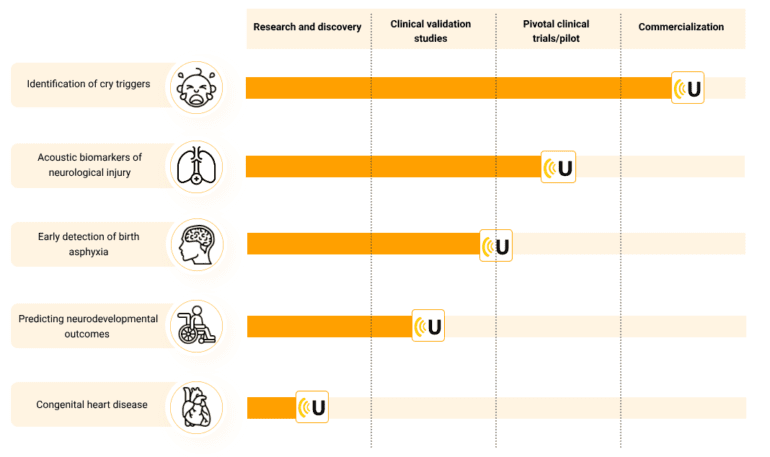TL;DR:
- AI technology in Africa interprets infant cries for medical insights.
- Algorithm detects normal and abnormal cry signals amid noise.
- Ubenwa, a startup, pioneers AI to interpret infants’ cries, aiding diagnosis.
- Ubenwa’s app identifies birth asphyxia signs and developmental milestones.
- Collaboration with hospitals builds a comprehensive database of cry sounds.
- Ubenwa’s innovation surpasses traditional assessments for neurological injury.
- Pre-seed funding of $2.5 million secures Ubenwa’s growth.
- Ubenwa’s AI solution is poised to reshape consumer and clinical pediatrics.
Main AI News:
In the heart of Africa, a groundbreaking revolution is unfolding in the realm of healthcare, propelled by the prowess of artificial intelligence. The continent has witnessed a transformative stride where experts are harnessing AI to decode the enigmatic language of infant cries. As Lichuan Liu, the Director of the Digital Signal Processing Laboratory at Northern Illinois University, elegantly phrases it, “Like a special language, there is lots of health-related information in various cry sounds.”
In a remarkable instance, dating back to 2019, Liu and her fellow researchers endeavored to decode the intricate tapestry of infant cries. They ingeniously employed a specific algorithm grounded in automatic speech recognition. This innovation enabled the distinction between normal and abnormal cry signals even within the cacophony of a noisy environment. Liu emphasizes, “The differences between sound signals actually carry the information.”
Before Liu’s pioneering work, Charles Onu, a visionary Nigerian tech entrepreneur and medical practitioner, embarked on a transformative odyssey. He co-founded Ubenwa, a software-as-a-service startup. This remarkable endeavor harnessed the potential of AI and machine learning algorithms to unravel the cryptic narratives woven within infants’ cries. Ubenwa’s technologies, including a cutting-edge mobile app and API, illuminate the path for precise medical interpretations.
Onu’s motivation struck a deeply personal chord. Witnessing a close relative born with birth asphyxia and subsequent hearing impairment kindled a fervent desire for transformative change. His resolve solidified during his collaboration with a health department at Enactus in Nigeria, where he encountered cases akin to his relative’s predicament.
Upon migrating to Canada and collaborating with neonatal experts, Onu’s vision crystallized. “There’s a lot of guesswork doctors have to do with babies,” he acknowledges. Ubenwa, born in 2017 after five years of rigorous research at Mila—an AI hub in Quebec, Canada—is destined to bridge the communication chasm between infant patients and medical experts.
Charles elucidates, “Our goal is to be a translator for baby cry sounds, providing a non-invasive way to monitor medical conditions everywhere you find a baby.” This vision encompasses delivery rooms, neonatal units, intensive care setups, nurseries, and even homes—the domains where the delicate symphony of infant cries plays out.
Presently, Ubenwa’s software stands as a sentinel, detecting early signs of birth asphyxia and potentially unraveling developmental milestones through astute cry triggers. In its nascent phase, the scarcity of infant cry samples posed a formidable challenge. To surmount this, Ubenwa cultivated a “close collaboration” with six hospitals, notably including Nigeria’s Enugu State University Teaching Hospital and Rivers State Teaching Hospital.
The magnitude of Ubenwa’s accomplishment rests upon its possession of the most expansive and diverse clinically annotated database of infant cry sounds. This invaluable asset serves as the cornerstone for the development of audio-based biomarkers. Notably, Ubenwa’s debut pilot, focusing on detecting neurological injuries stemming from birth asphyxia, showcased a remarkable 40% enhancement over the prevalent APGAR scoring—the quintessential birth evaluation criterion.
Dr. Guilherme Sant’Anna, a Neonatologist at Montreal Children’s Hospital, lauds Ubenwa’s innovation, asserting, “The significance of the app lies in the fact that it is fast, cost-effective, non-invasive, and easy to use.” The simplicity belies the profound impact; Ubenwa’s innovation offers an ongoing, non-invasive means to track neurological biomarkers—a feat that had hitherto been elusive without costly and resource-intensive methods like MRI scans.
A testament to Ubenwa’s mettle lies in its successful pre-seed funding round, raising $2.5 million with Radical Ventures at the helm. Sanjana Basu, an investor at Radical Ventures, underscores the potential, emphasizing, “Deciphering a baby’s cry using machine learning can open up a range of possibilities in the consumer and clinical pediatrics market where demand for better digital products is only growing.“
Yet Ubenwa’s vision transcends product development. The startup invests ardently in elevating medical practitioners in underserved communities. In a laudable stride, Ubenwa trained pediatricians at the Lagos State University Teaching Hospital, imparting expertise in the Bayley Assessment—an examination vital for assessing neurodevelopmental delays in children. By imparting these skills, Ubenwa empowers professionals to contribute effectively while delivering superior care.
In the intricate tapestry of Ubenwa’s journey, Charles Onu collaborates with a formidable team spanning clinical development, machine learning, software engineering, and business operations. An ensemble of advisors, including luminaries such as Professor Edward Alikor, fortify this endeavor. This remarkable confluence of visionaries is steering Ubenwa towards a future where infant cries serve as vital insights into health—a future that resonates deeply with Charles Onu’s formative experiences growing up in Nigeria.
As Charles eloquently sums it up, “It’s really a gift to be able to contribute in this way.” Through the fusion of technology and empathy, Ubenwa’s odyssey is etching a new narrative—a narrative where the language of infant cries speaks volumes about their well-being.
Conclusion:
Ubenwa’s pioneering use of AI to decipher infant cries has ushered in a transformative era in healthcare. By providing fast, cost-effective, and non-invasive insights, Ubenwa not only addresses medical gaps but also presents substantial opportunities for growth in the clinical pediatrics market. The fusion of cutting-edge technology and compassionate care marks a significant leap forward, promising enhanced infant care and improved diagnostics.

